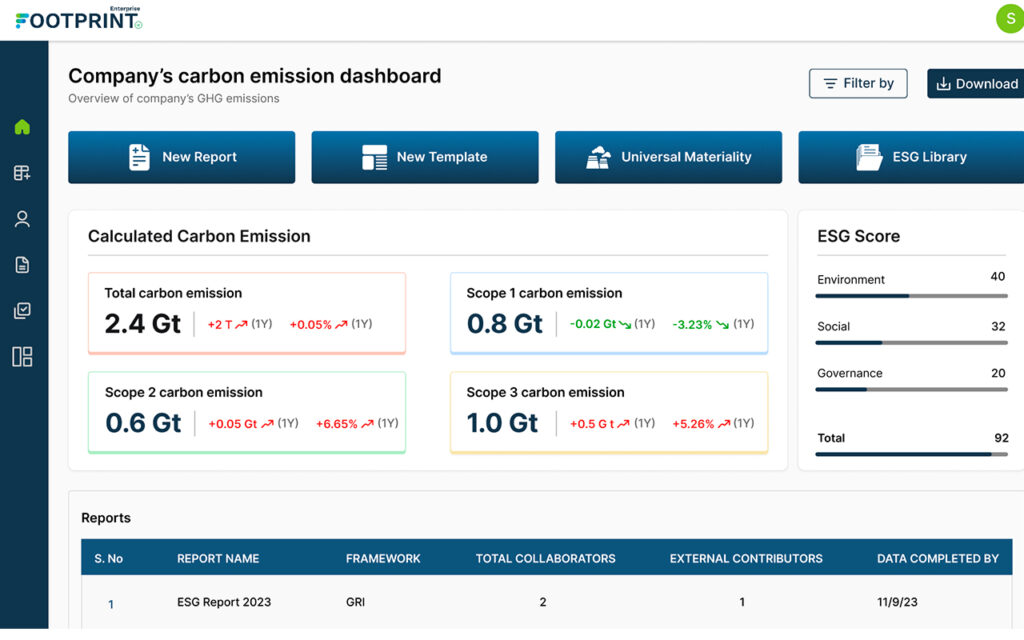Sustainable Transformation: Future ESG Management
TRST01 Footprint
21st January 2024

The world faces unprecedented challenges, with climate change, social inequalities, and corporate scandals. In response, a new paradigm is emerging in the business world – ESG management. This framework weaves together environmental, social, and governance considerations into the very fabric of an organization, making them integral to its operations and decision-making processes.
ESG management is critical for businesses. It guides them towards a sustainable future by accounting for their impact on the environment, society, and stakeholders. This framework helps navigate regulations, stakeholder expectations, and market pressures for long-term success.
The road ahead for ESG is bright. While challenges like standardization and greenwashing remain, advancements in technology, data analytics, and ESG reporting frameworks pave the way for greater transparency and accountability. Governments and investors are playing their part by creating supportive frameworks and incentives.
ESG management represents a paradigm shift in the corporate world, where environmental, social, and governance considerations are integrated into the core of an organization. This approach is increasingly becoming the guiding compass for businesses committed to achieving a sustainable and prosperous future. As organizations gear up for ESG empowerment, they move beyond mere reporting. They are actively defining and managing climate goals and monitoring the dynamics of ESG to ensure their operations align with these new, responsible standards. This proactive stance in embracing ESG principles marks a significant transformation in how businesses operate and envision their role in a global context.
Why the shift? The shift towards responsible business practices through ESG (Environmental, Social, and Governance) management is driven by a confluence of factors, each playing a pivotal role in reshaping corporate strategies:
- Public Awareness: Heightened consciousness about climate change and ethical standards has led to a demand for greater corporate responsibility. This public scrutiny pushes companies to adopt practices that are environmentally and socially responsible.
- Investor Demand: Investors are increasingly aware of the risks associated with poor ESG practices. They seek out companies that proactively manage these risks, recognizing the long-term financial benefits of sustainable operations.
- Governmental Policies: Regulatory frameworks are evolving, with governments incentivizing sustainable practices and penalizing unsustainable ones. This regulatory pressure encourages businesses to align with ESG standards.
The benefits of embracing ESG extend far beyond compliance, offering substantial advantages:
- Enhanced Resilience: Companies actively managing environmental risks, such as climate change and resource scarcity, are better positioned to withstand future challenges and disruptions.
- Improved Financial Performance: There is a growing body of evidence linking strong ESG practices with long-term profitability. This correlation stems from reduced operational costs, a stronger brand reputation, and heightened employee engagement.
- Social License to Operate: In an era where communities are more vocal about corporate impacts, proactive engagement and addressing concerns through ESG initiatives build trust and goodwill.
- Attracting and Retaining Talent: With younger generations prioritizing purpose and values, organizations with robust ESG profiles are more appealing to top talent, aiding in both recruitment and retention.
In addition to these factors, four critical ‘R’s further encapsulate the essence of ESG’s growing importance:
- Risk Management: Identifying and mitigating ESG-related risks is crucial for long-term sustainability and avoiding potential crises that can arise from environmental mishaps, social discontent, or governance failures.
- Rewards in Investment: Companies excelling in ESG are often rewarded with increased investment from socially conscious investors. This trend reflects a broader shift in capital markets, where sustainability is becoming a core criterion for investment decisions.
- Regulation Compliance: Adhering to evolving regulations is not just about avoiding penalties; it’s about staying ahead in an increasingly regulated world where sustainability standards are becoming the norm.
- Reputation Management: A strong ESG record enhances a company’s reputation, bolstering customer loyalty and stakeholder trust. This reputational advantage can be a significant differentiator in competitive markets.
The integration of ESG principles into business practices is not merely a trend but a strategic imperative. It reflects a comprehensive approach to managing a company’s environmental footprint, social impact, and governance structure, crucial for achieving long-term success in an increasingly aware and connected world.
Implementing ESG is a more than one-size-fits-all approach. Every organization has its unique context and risks that determine its Environmental, Social, and Governance (ESG) priorities. ESG factors are critical in assessing an organization’s overall sustainability and social responsibility performance.
Environmental factors include reducing the carbon footprint, minimizing waste, adopting renewable energy sources, and practicing sustainable resource management. Organizations must strive to minimize their impact on the environment while promoting sustainable practices.
Social factors include fostering diversity and inclusion, ensuring employee well-being and safety, protecting human rights throughout the supply chain, and engaging with communities. Organizations must prioritize social responsibility by creating a positive impact on their employees and the communities in which they operate.
Governance factors include implementing ethical business practices, ensuring transparency and accountability, maintaining strong risk management systems, and promoting responsible board oversight. Organizations must maintain high ethical standards and corporate governance practices to build trust with their stakeholders and investors.
Ultimately, ESG management is more than just a fad. In today’s business world, the adoption of ESG (Environmental, Social and Governance) principles is a major shift that is transforming the way organizations operate. By embracing ESG, businesses can align their operations with the planet’s and society’s needs while safeguarding their own future.

Revolutionizing ESG Management with TRST01 Footprint
The TRST01 Footprint stands as a testament to technological innovation and commitment to sustainability. It is not merely a tool but a holistic solution that assists organizations in navigating the complexities of ESG compliance and performance. The solution has been meticulously crafted to support organizations in establishing, managing, monitoring, and effectively reporting their ESG goals and metrics.
Key Features of TRST01 Footprint
Goal Setting and Management
The first step towards impactful change is setting clear, achievable goals. The TRST01 Footprint empowers organizations to define precise climate and sustainability objectives. This feature provides a structured framework for not only setting these goals but also methodically managing and achieving them. This proactive approach ensures that sustainability goals are integrated into an organization’s core strategic planning.
Monitoring ESG Parameters
Continuous monitoring is crucial in the dynamic field of ESG. The TRST01 Footprint excels in this area with its advanced capabilities, enabling real-time tracking of a wide range of ESG metrics. This functionality ensures that organizations stay on course with their sustainability commitments, enabling timely interventions and adjustments.
Automated Reporting
One of the most daunting aspects of ESG compliance is reporting. The TRST01 Footprint simplifies this process through automation, ensuring compliance with various sustainability standards and regulations. This automation significantly reduces the workload and complexities involved in manual reporting, thereby enhancing efficiency and accuracy.
Global Standard Compatibility
In a globalized business environment, adherence to international standards is paramount. The TRST01 Footprint is versatile and globally compatible, supporting all major sustainability reporting standards, including GRI, BRSR, SGX, TCFD, and CDP. It also aligns with the ISSB standards of the IFRS, making it an indispensable solution for businesses operating across borders.
Enhanced Efficiency and Accuracy
The TRST01 Footprint is designed to save time and increase the reliability of data and reports. Automating various aspects of ESG management and reporting ensures that businesses can focus on what truly matters – implementing sustainable practices and making informed decisions.
Facilitating Corporate Responsibility
The ultimate goal of the TRST01 Footprint is to aid organizations in proactively managing and improving their environmental, social, and governance impacts. This goes beyond mere compliance; it’s about making a tangible, positive difference in the world.
Impact and Importance of TRST01 Footprint in the Business World
The introduction of TRST01 Footprint into the market represents a significant leap forward in sustainable business practices. It caters to the growing need for a comprehensive solution that can handle the intricacies of ESG management and reporting efficiently. The solution’s adaptability to global standards makes it a valuable asset for companies of all sizes and sectors aiming to excel in their sustainability endeavours.
Businesses using TRST01 Footprint can expect not just streamlined operations but also enhanced credibility and trust among stakeholders. This trust is paramount in today’s market, where consumers, investors, and regulatory bodies are increasingly focusing on sustainable and responsible business practices.
As we progress into a future where sustainability is not just preferred but essential, solutions like the TRST01 Footprint will play a pivotal role in guiding businesses towards a greener and more responsible path. The TRST01 Footprint is more than just a solution; it’s a partner in the journey towards sustainability, enabling businesses to not only meet but exceed their ESG goals, thereby contributing positively to a sustainable future.
In conclusion, the TRST01 Footprint is not just revolutionizing ESG management and reporting; it’s reshaping the way businesses view and approach sustainability. Its role in empowering organizations to manage their sustainability journey effectively is invaluable, marking it as a crucial tool in the arsenal of any forward-thinking business committed to positively impacting the world.
Write to us journey@trst01.com




